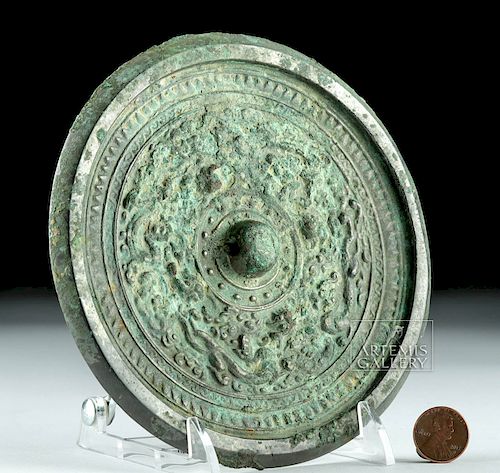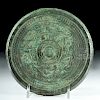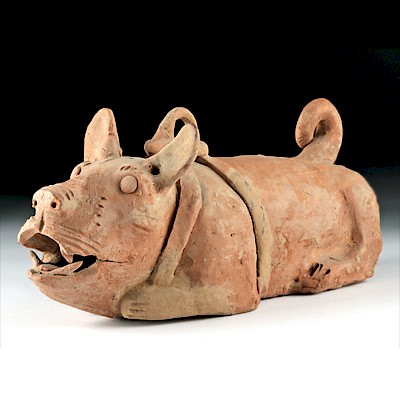Chinese Han Dynasty Bronze Mirror
Lot 57c
About Seller
Artemis Fine Arts
686 S Taylor Ave, Ste 106
Louisville, CO 80027
United States
Selling antiquities, ancient and ethnographic art online since 1993, Artemis Gallery specializes in Classical Antiquities (Egyptian, Greek, Roman, Near Eastern), Asian, Pre-Columbian, African / Tribal / Oceanographic art. Our extensive inventory includes pottery, stone, metal, wood, glass and textil...Read more
Estimate:
$800 - $1,200
Absentee vs Live bid
Two ways to bid:
- Leave a max absentee bid and the platform will bid on your behalf up to your maximum bid during the live auction.
- Bid live during the auction and your bids will be submitted real-time to the auctioneer.
Bid Increments
| Price | Bid Increment |
|---|---|
| $0 | $25 |
| $300 | $50 |
| $1,000 | $100 |
| $2,000 | $250 |
| $5,000 | $500 |
| $10,000 | $1,000 |
| $20,000 | $2,500 |
| $50,000 | $5,000 |
| $100,000 | $10,000 |
| $200,000 | $20,000 |
About Auction
By Artemis Fine Arts
Sep 13, 2018
Set Reminder
2018-09-13 10:00:00
2018-09-13 10:00:00
America/New_York
Bidsquare
Bidsquare : Ancient | Asian | Ethnographic - Fall Variety
https://www.bidsquare.com/auctions/artemis-gallery/ancient-asian-ethnographic---fall-variety-3432
Travel the world and back in time... Antiquities from Egypt, Greece, Italy and the Near East, Asian, Pre-Columbian, African / Tribal / Oceanic, Native American, Spanish Colonial, Russian Icons, Fine Art, much more! Artemis Fine Arts info@artemisgallery.com
Travel the world and back in time... Antiquities from Egypt, Greece, Italy and the Near East, Asian, Pre-Columbian, African / Tribal / Oceanic, Native American, Spanish Colonial, Russian Icons, Fine Art, much more! Artemis Fine Arts info@artemisgallery.com
- Lot Description
East Asia, China, Han Dynasty, ca. 206 BCE to 220 CE. An incredible bronze mirror with cast motifs on its decorated back and a raised, nub-like handle on the back. The handle is pierced through laterally, allowing the mirror to be worn. The cast motifs include flowing floral motifs and abstract long-tailed birds - probably phoenixes. A border of zigzagging lines encircles the interior motifs, and the rim has a thick, raised lip. The copper alloy here contains a great deal of tin, giving the surface a silvery appearance. Size: 5.8" W (14.7 cm)
Bronze mirrors have a long history in China - the oldest known comes from a tomb dated to ca. 2100 to 1600 BCE. By the Han Dynasty, mirrors like this one were immensely popular, and were produced in workshops at various regional centers in order to keep up with the demand from members of the royal court, court officials, and regional government workers. Mirrors like this one were expensive, and only owned by elites in the society. The cast inscription around the body of this one dates it to ca. 200 BCE and the Western Han period; it is meant to bring good fortune to the living and, when placed in a grave, to keep evil spirits away from the dead. A mirror like this one would have been used both for utilitarian purposes - starting fires and seeing one's reflection - and for spiritual - to see invisible spirits. The presence of the phoenix in the animal design may mean that this was a mirror given to a bride and later hung on the marriage bed, as the phoenix was a good omen for marriages.
Provenance: ex-Wong collection, Lotus Trading, acquired around 1974
All items legal to buy/sell under U.S. Statute covering cultural patrimony Code 2600, CHAPTER 14, and are guaranteed to be as described or your money back.
A Certificate of Authenticity will accompany all winning bids.
We ship worldwide and handle all shipping in-house for your convenience.
#137924Lightly encrusted pale green patina on surface, with nice silvery patina shining through underneath the green. Motifs have some light wear but are still clearly visible.Condition
- Shipping Info
-
All shipping is handled in-house for your convenience. Your invoice from Artemis Gallery will include shipping calculation instructions. If in doubt, please inquire BEFORE bidding for estimated shipping costs for individual items.
-
- Buyer's Premium



 EUR
EUR CAD
CAD AUD
AUD GBP
GBP MXN
MXN HKD
HKD CNY
CNY MYR
MYR SEK
SEK SGD
SGD CHF
CHF THB
THB













